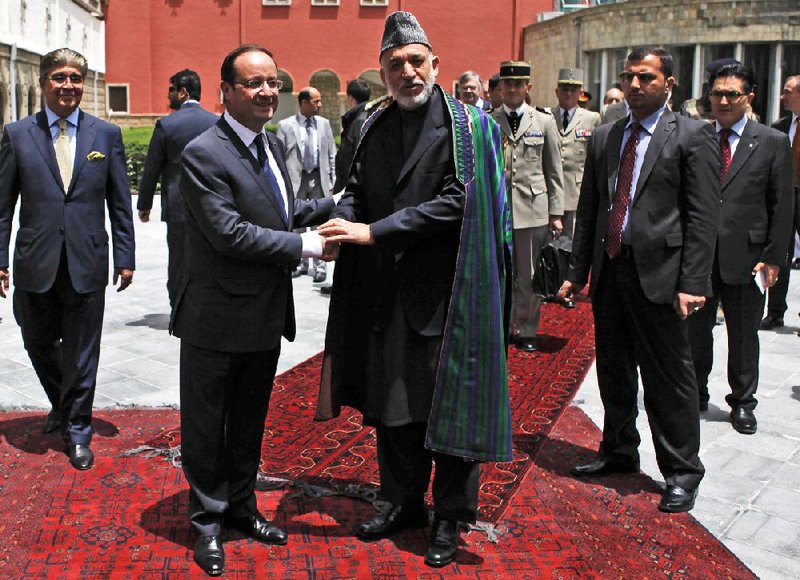KABUL, Afghanistan — President Francois Hollande of France made a surprise visit to French troops in Kapisa province Friday, assuring them that their mission in Afghanistan would be over this year.
READ MORE
http://www.arkansas…"> The war in Afghanistan
The visit came less than a week after the new French president announced at a NATO summit that France would pull its troops out of Afghanistan by the end of this year, two years ahead of the 2014 deadline previously agreed to by NATO and the U.S. for withdrawal.
At a news conference with President Hamid Karzai of Afghanistan, Hollande said that while French combat forces would leave this year, about 1,400 French advisers and trainers would remain in the country to help the Afghan Defense and Interior ministries. In addition, he said, French nonmilitary aid will be increased, although he did not give any specifics.
Karzai did not refer to the French troop withdrawal during the brief news conference, which was cut short by rain.
U.S. and other NATO officials have said privately that they are upset by the new French position because it will encourage other allies to break the NATO vow of “in together, out together.” Hollande made the pullout pledge during his election campaign, which pushed Nicolas Sarkozy, then the president, to declare that he would withdraw combat forces by the end of 2013. Sarkozy began considering an earlier pullout after the killings of six French soldiers by Afghan soldiers in attacks on Dec. 29 and Jan. 20.
But the NATO officials said they also realized that Hollande could not change his mind so quickly after his election victory this month. So at the NATO summit last weekend, allies accepted his decision, and Hollande strengthened his pledge to withdraw in consultation with allies and the Afghans, to continue training Afghan soldiers and police officers and to help fund the Afghan security forces after NATO withdraws.
Hollande said Friday that Afghan forces would soon be capable of maintaining security in the country themselves.
“The time for Afghan sovereignty has come,” Hollande said during his meeting with French troops. “The terrorist threat that targeted our territory, while it hasn’t totally disappeared, is in part lessened.”
He did not provide a breakdown for the roles of the 1,400 soldiers who will remain past 2012 or how long they would stay. Hollande said French equipment would be taken out by ground routes, but he did not say which ones.
Guy Teissier, a lawmaker from Sarkozy’s party who heads the defense commission of the National Assembly, pointed to a “contradiction” between Hollande’s campaign rhetoric and his withdrawal plan after his election.
Teissier also said the quick pullout would expose French troops. “Once the combat troops are gone, who’s going to protect the 1,000-odd soldiers responsible for bringing home the equipment we’ve left behind?” he said on BFM Television. “It’s a very big risk for our soldiers. ... It leads me to believe that Francois Hollande doesn’t understand defense matters and world geopolitics.”
The French president also met with representatives of Afghan human-rights groups, civic organizations and private enterprise, and stressed that France would remain committed to Afghanistan even as its troops leave, according to one participant.
With 3,300 troops in Afghanistan, France has the fifth-largest troop contingent. In terms of combat power, however, it is the third-most important, after the U.S. and Britain. Germany and Italy have more troops in Afghanistan but generally refrain from combat operations.
President Barack Obama last year decided to pull out 33,000 U.S. combat troops by September. The coalition has started handing over security control to Afghan army and police in areas home to 75 percent of the population, with a goal of putting them in the lead for all the country by mid-2013. NATO and other foreign forces would then be in a support role for the 352,000-strong Afghan National Security Forces.
Meanwhile, the commanding Marine general in one of Afghanistan’s hardest-fought regions said Friday that he is seeing big improvements in the vetting of Afghan recruits to the country’s security forces after attacks by Afghan soldiers on their NATO partners. Afghan soldiers have carried out more than 20 deadly attacks on their NATO partners this year.
Maj. Gen. Charles Gurganus said he believes Afghan forces will be ahead of schedule and take the lead in securing Helmand province by this fall.
Elsewhere, five Afghan civilians were killed and 16 wounded when the passenger bus they were in hit a roadside bomb in Ghazni province, said Zarewar Zahid, the police chief of Ghazni. Zahid said many of the wounded were in critical condition.
A second passenger bus was blown up by a roadside bomb in southern Helmand province, with two people reported killed and three wounded, said Gulai Khan, the district governor of Gerishk District. Authorities blamed the Taliban for both attacks.
Information for this article was contributed by Rod Nordland, Habib Zahori, Jawad Sukhanyar and a staff member of The New York Times, and by Julie Watson, Deb Riechmann, Jamey Keaten, Mirwais Khan, Angela Charlton and Sarah DiLorenzo of The Associated Press.
Front Section, Pages 6 on 05/26/2012
